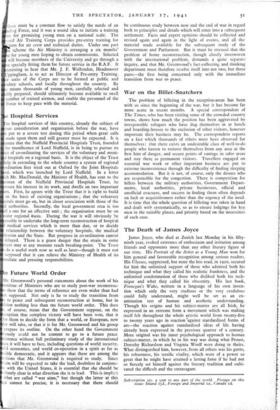e Future World Order
r. Greenwood's personal statements about the work of his mittee of Ministers who are to study post-war reconstruc- n show that the terms of reference are even wider than had n supposed. Not only is he to study the transition from r to peace and subsequent reconstruction at home, but in don nothing less than the future world order. This does , of course, mean that the Government suppose, on the umption that complete victory will have been won, that it for them to decide the form that a world, or European, new er will take, or that it is for Mr. Greenwood and his group prepare its outline. On the other hand the Government viously cculd not be content to go to a future peace ference without full preliminary study of the international ues it will have to face, including questions of world security, rld economics, and world co-operation in a spirit as far as ssible democratic, and it appears that these are among the estions that Mr. Greenwood is required to study. Since tain will be expected to take the lead, doubtless in conjunc- t', with the United States, it is essential that she should be solutely clear in what direction she is to lead. This is implicit what are called " war aims," but though the latter at this ge cannot be precise, it is necessary that there should be continuous study between now and the end of war in regard both to principles and details which will enter into a subsequent settlement. Facts and expert opinions should be collected and revised again and again in the light of events, and all the material made available for the subsequent study of the Government and Parliament. But it must be stressed that the problem of home reconstruction, though closely interwoven with the international problem, demands a quite separate inquiry, and that Mr. Greenwood's fact-collecting and thinking department must therefore resolve itself into not two, but three parts—the first being concerned only with the immediate transition from war to peace.






























 Previous page
Previous page